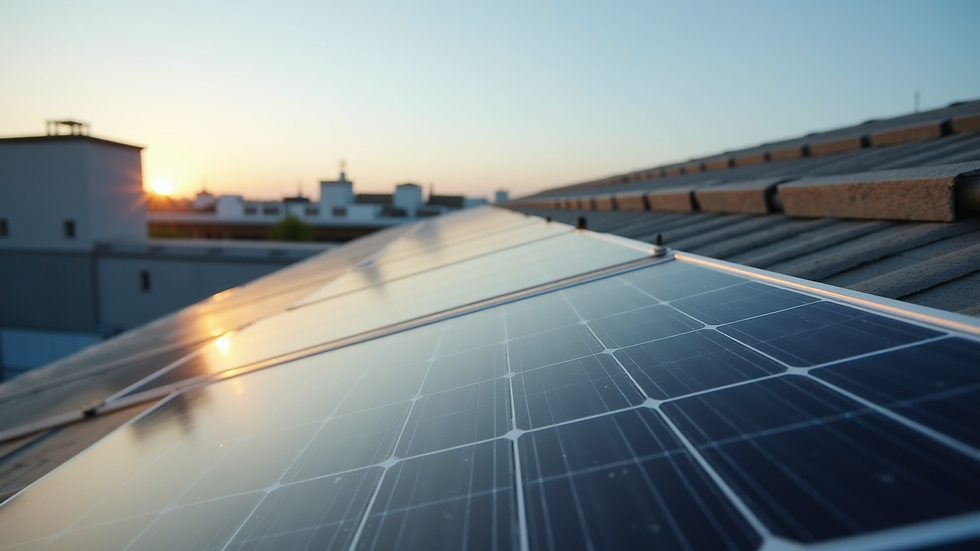Innovative Strategies for a Sustainable Future
- Anna Hutchison
- Sep 29
- 3 min read
The world is rapidly changing, and the need for sustainable solutions has never been more urgent. Innovative strategies for a sustainable future ideas are essential to address environmental challenges, economic shifts, and social equity. This blog post explores practical approaches that can help build a resilient and thriving future for all. From renewable energy to circular economies, these strategies offer actionable insights to inspire change.
Exploring Sustainable Future Ideas
Sustainability is about meeting present needs without compromising the ability of future generations to meet theirs. To achieve this, innovative ideas must focus on reducing waste, conserving resources, and promoting social well-being. Here are some key sustainable future ideas that are gaining momentum:
Renewable Energy Adoption: Solar, wind, and hydroelectric power are transforming how we generate electricity. For example, community solar projects allow neighbourhoods to share clean energy, reducing reliance on fossil fuels.
Circular Economy Models: Instead of the traditional take-make-dispose approach, circular economies emphasize reuse, repair, and recycling. Companies like Patagonia encourage customers to repair clothing, extending product life and reducing waste.
Sustainable Agriculture: Techniques such as permaculture and agroforestry improve soil health and biodiversity while producing food sustainably. Urban farming initiatives also bring fresh produce closer to city dwellers, cutting transportation emissions.
Implementing these ideas requires collaboration between governments, businesses, and individuals. Policies that incentivise green technologies and education programs that raise awareness are crucial to driving widespread adoption.

What does it mean if you can't envision your future?
Not being able to envision your future can signal uncertainty and anxiety about what lies ahead. This feeling often stems from rapid changes in society, climate concerns, or economic instability. When people struggle to picture a positive future, it can hinder motivation to engage in sustainable practices.
Understanding this challenge is vital for creating strategies that inspire hope and action. Here are some ways to address this issue:
Education and Awareness: Providing clear information about sustainability and its benefits helps people see the possibilities for a better future.
Community Engagement: Participating in local sustainability projects fosters a sense of belonging and purpose.
Personal Empowerment: Encouraging small, achievable actions builds confidence and a sense of control over one’s impact.
By helping individuals and communities envision a sustainable future, we can cultivate the collective will needed to implement innovative solutions.

Innovative Technologies Driving Sustainability
Technology plays a pivotal role in shaping a sustainable future. Innovations are emerging across various sectors, offering new ways to reduce environmental impact and improve quality of life. Some notable technologies include:
Smart Grids: These advanced electrical grids optimise energy distribution and integrate renewable sources efficiently.
Electric Vehicles (EVs): EVs reduce greenhouse gas emissions and dependence on fossil fuels. Advances in battery technology are making them more affordable and practical.
Water Purification Systems: New filtration and desalination technologies provide clean water in areas facing scarcity.
Investing in research and development is essential to accelerate these technologies. Governments and private sectors must collaborate to create infrastructure and policies that support sustainable tech adoption.

Practical Steps for Individuals to Contribute
Everyone can play a role in building a sustainable future. Here are some practical steps individuals can take:
Reduce Energy Consumption: Use energy-efficient appliances, switch off unused devices, and consider renewable energy options for your home.
Minimise Waste: Adopt habits like composting, recycling, and choosing products with minimal packaging.
Support Sustainable Brands: Purchase from companies committed to ethical and eco-friendly practices.
Advocate for Change: Engage with local policymakers to support sustainability initiatives and regulations.
Small actions, when multiplied across communities, can lead to significant positive impacts. Staying informed and involved is key to maintaining momentum.
Building a Resilient Tomorrow
Creating a sustainable future requires resilience - the ability to adapt and thrive amid challenges. This means designing systems that are flexible, inclusive, and regenerative. Some strategies to build resilience include:
Diversifying Energy Sources: Combining solar, wind, and other renewables to ensure stable power supply.
Enhancing Food Security: Supporting local food systems and sustainable farming to reduce vulnerability.
Promoting Social Equity: Ensuring all communities have access to resources and opportunities.
By focusing on resilience, societies can better withstand environmental, economic, and social shocks while progressing toward sustainability.
For more insights and resources on sustainable living, visit withourfutureinmind.

Innovative strategies for a sustainable future ideas are not just concepts but actionable pathways. By embracing renewable energy, circular economies, and community engagement, we can create a world that supports both people and the planet. The journey toward sustainability is ongoing, and every step counts.
















Comments